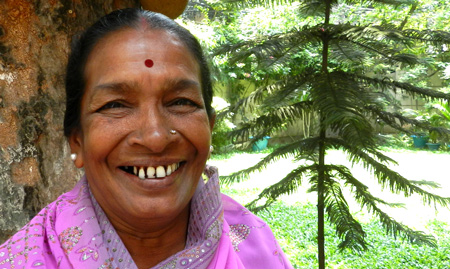Rajena’s Story - Building Women’s Resilience in Climate Change Affected Areas
Date:
Author: Thaiza Castilho
Rajena Boiragi wakes up at six in the morning to take care of her family fishing pond. She depends on the tides to collect crabs and shrimps but usually spends around five hours a day in muddy waters gathering what she can to sell at the local market. Rajena is 55 years old and lives with her son, Heatler and her daughter, Indira, in Holdibunia, located in the Mongla upazilla, around 400 kilometers south of Bangladesh.

Rajena started her own pond in 2007 with the knowledge of fresh water farming she inherited from her family: "I decided it would be a good way to earn a better income," she says. Before starting her business she used to work for an organization that promoted family planning in the village but her salary was around fifty dollars a month. “My husband left 20 years ago when the children were small, I struggled to buy food and provide education for them, my income was limited so I was always looking to complement it," she tells.
Rajena leads a group of 25 women in Holdibunia and has received support from BRAC, a local partner organization who is working together with UN Women’s in different areas of the country to build competence at the community level on disaster preparedness and increase local villager’s ability to cope with natural disasters.
By working in the fish pond Rajena has doubled her income, making now the double of what she made in the past. Nevertheless, she is not planning of stopping there, she is thinking of investing in poultry and in helping her daughter setting up her own textile printing business, a skill Indira learned through a government training that encourages village women to develop their cottage handicraft skills.
However, Rajena’s life has not been easy, in May 2009, she lost all her fish when the cyclone Aila hit the country. At the time 179 people died, at least 800 were injured and more than 2.6 million were affected. Throughout the country, Aila left an estimated 500,000 people homeless, including Rajena, who had to move to a shelter located in a primary school. “I lost everything, my house and the pond were washed away with roads and people’s belongings," she remembers.
Today, six years since the disaster, Rajena managed to rebuild the house and the fishing pond. Now, as a group leader, she encourages other women to invest in their capacities as well. “Even the women who lost their husbands in 2009 are now succeeding and moving forward. They learned to overcome the challenges presented in their lives thanks to the investment made on us”.
On May 18, Rajena travelled to the country’s capital, to speak about her experiences during a high-level meeting on south-south and triangular cooperation in the post 2015 development agenda, held at one of the largest hotels in Bangladesh. Her message to the participants, who among were ministers and their advisers was: “I am happy now because I had the chance of restarting my life. By learning how to be strong and resilient. More women can benefit from this and improve their lives too."
Although the group leader says she does not face any discrimination by owning her business and that people respect her in the village, she never goes to the local market by herself. “Local merchants usually pay less for the fish if a woman is selling, so my son accompanies me for us to get the fair price”. She also tried to stop an early marriage she heard of in the village, but did not succeeded.
Bangladesh has been globally recognized for the progress made in improving the situation of women and girls, however, there is a continuous need to address challenges such equal wage rights, economic empowerment, end child marriage and violence against women. UN Women Bangladesh has been working with several organizations to address such issues.
When asked if she was prepared if a cyclone hit again, she said without a doubt: “We learned to make stronger houses, to protect our fish with nets, to stay cautions for early warning messages. I will not lose anything again, if it happens, I have the strength to rebuild it as long as my family is together”.